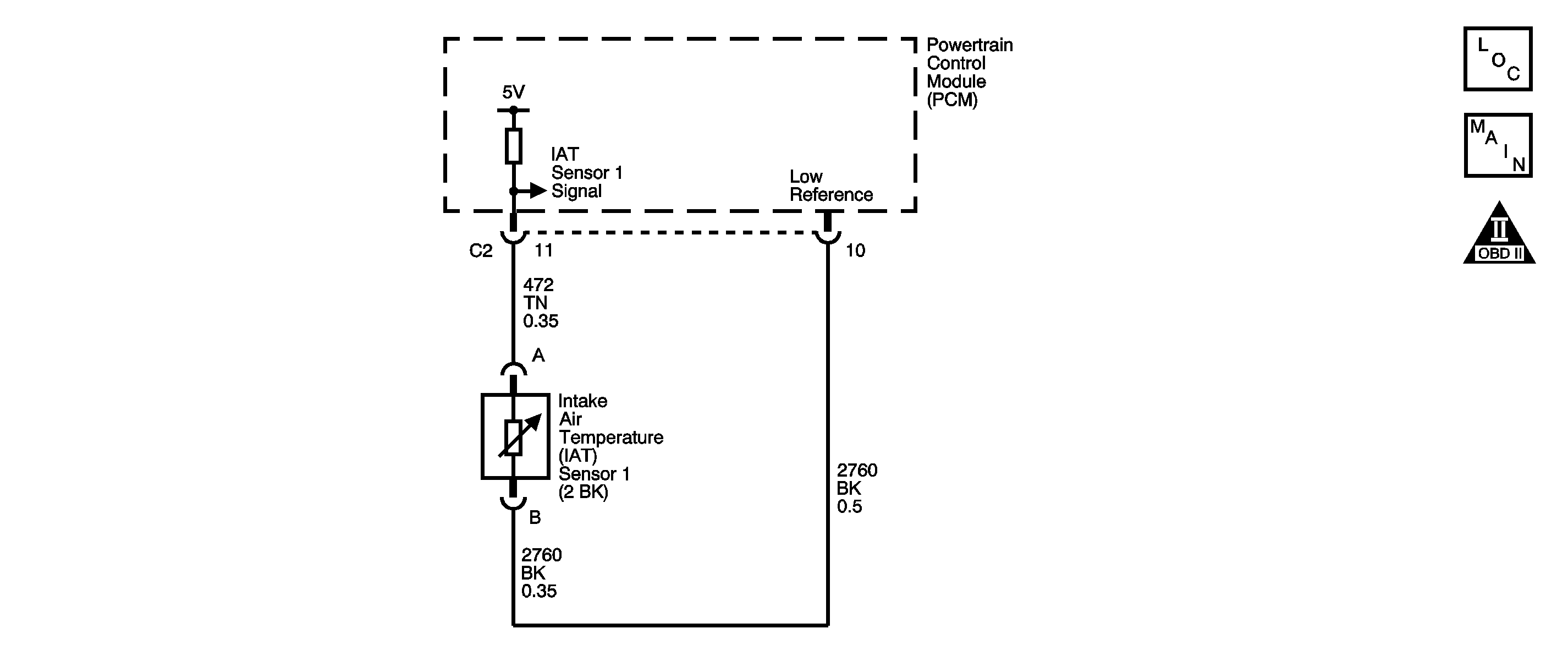
Circuit Description
This diagnostic monitors the signal of the intake air temperature (IAT) sensor. The IAT sensor is a variable resistor that measures the temperature of the intake air. The powertrain control module (PCM) supplies 5 volts to the IAT signal circuit and supplies a ground to the low reference circuit. If the PCM detects a high IAT signal voltage, which is a low temperature indication, this DTC sets.
The following table illustrates the difference between temperature, resistance, and voltage:
IAT | IAT Resistance | IAT Signal Voltage |
|---|---|---|
Cold | High | High |
Warm | Low | Low |
DTC Descriptor
This diagnostic procedure supports the following DTC:
DTC P0113 Intake Air Temperature (IAT) Sensor 1 Circuit High Voltage
Conditions for Running the DTC
| • | The ignition is ON. |
| • | DTC P0112 is not set. |
| • | DTC P0113 runs continuously once the above conditions are met. |
Conditions for Setting the DTC
| • | The PCM detects that the IAT sensor 1 signal voltage is 4.95 volts or more. |
| • | The above condition is present for at least 5 seconds. |
Action Taken When the DTC Sets
| • | The powertrain control module (PCM) illuminates the malfunction indicator lamp (MIL) when the diagnostic runs and fails. |
| • | The PCM records the operating conditions at the time the diagnostic fails. The PCM stores this information in the Freeze Frame/Failure Records. |
Conditions for Clearing the MIL/DTC
| • | The PCM turns OFF the malfunction indicator lamp (MIL) after 3 consecutive ignition cycles that the diagnostic runs and does not fail. |
| • | A last test failed, or current DTC, clears when the diagnostic runs and does not fail. |
| • | A history DTC clears after 40 consecutive warm-up cycles, if no failures are reported by this or any other emission related diagnostic. |
| • | Use a scan tool in order to clear the MIL and the DTC. |
Diagnostic Aids
| • | Use the Temperature vs Resistance table in order to test the IAT sensor at various temperature levels in order to evaluate the possibility of a skewed sensor. A skewed sensor could result in a driveability condition. If the engine has sat overnight, the engine coolant temperature and the intake air temperature values should display within a few degrees. If the temperatures are not within 3°C (5°F), refer to Temperature Versus Resistance - Intake Air Temperature Sensor . |
| • | For an intermittent condition, refer to Intermittent Conditions . |
Test Description
The numbers below refer to the step numbers in the diagnostic table.
-
The Diagnostic System Check-Vehicle prompts the technician to complete some basic checks and store the Freeze Frame data on the scan tool if applicable. This creates an electronic copy of the data taken when the fault occurred. The information is then stored in the scan tool for later reference.
-
This step will determine if a fault is present.
-
Review the Freeze Frame data to determine when the DTC set. Always record this information.
-
This step determines if there is a fault in the IAT circuit wiring.
-
After replacing the PCM a new minimum throttle position and idle speed must also be established.
Step | Action | Value(s) | Yes | No |
|---|---|---|---|---|
Connector End View Reference: Powertrain Control Module Connector End Views or Engine Controls Connector End Views | ||||
Did you perform the Diagnostic System Check - Vehicle? | -- | Go to Step 2 | ||
Is the IAT less than or equal to the specified value? | -40°C (-40°F) | Go to Step 4 | Go to Step 3 | |
Does the DTC fail this ignition cycle? | -- | Go to Step 4 | Go to Diagnostic Aids | |
Is the IAT equal to or more than the specified value? | 168°C (334°F) | Go to Step 6 | Go to Step 5 | |
5 |
Is the IAT equal to or more than the specified value? | 168°C (334°F) | Go to Step 7 | Go to Step 8 |
6 |
Did you find and correct the condition? | -- | Go to Step 12 | Go to Step 10 |
7 |
Did you find and correct the condition? | -- | Go to Step 12 | Go to Step 9 |
8 |
Did you find and correct the condition? | -- | Go to Step 12 | Go to Step 9 |
9 |
Did you find and correct the condition? | -- | Go to Step 12 | Go to Step 11 |
10 | Replace the IAT sensor 1. Refer to Intake Air Temperature Sensor 1 Replacement . Did you complete the replacement? | -- | Go to Step 12 | -- |
Did you complete the replacement? | -- | Go to Step 12 | -- | |
12 |
Does the DTC run and pass? | -- | Go to Step 13 | Go to Step 2 |
13 | Observe the Capture Info with a scan tool. Are there any DTCs that have not been diagnosed? | -- | System OK | |
